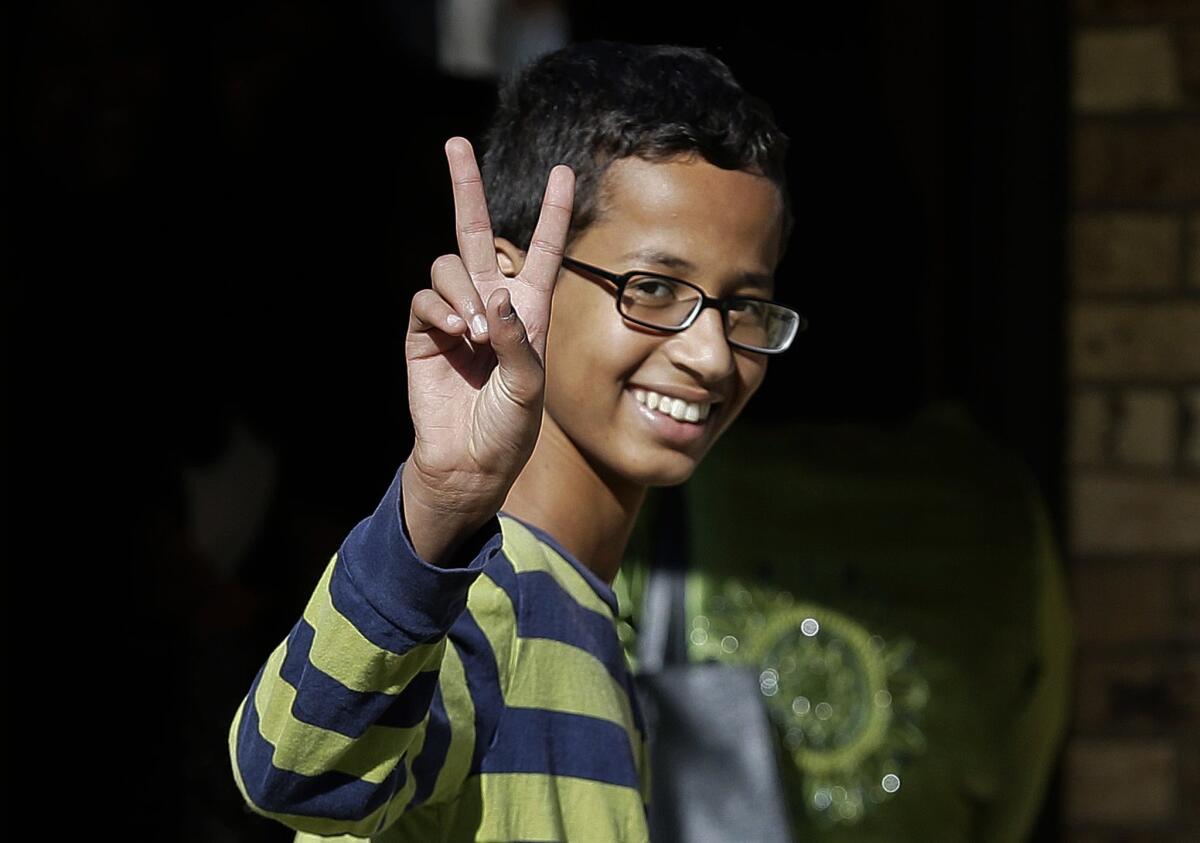How to talk to your children about being Muslim

Ahmed Mohamed, 14, became a symbol of challenges facing Muslim youth after he was arrested at his school in September when a teacher thought a homemade clock he built was a bomb.
- Share via
Muslim American parents face the frightening prospect of their children confronting harassment at school, or being questioned about their faith. Studies have found that Muslim youth face bullying at twice the rate of their peers. Last week, U.S. Atty. Gen. Loretta Lynch encouraged parents to contact the Department of Education and the Department of Justice if their children are threatened. Below, Afeefa Syeed, an educator and parent based in the Washington, D.C., area, shares some guidelines she developed for her community.
It's toughest for the young ones who look at pictures of the bad guys and say, "But Mama, he looks like me."
Our American Muslim children are growing up in a world of warped lunacy that takes what they know about a beloved prophet or God and turns it into reasons for anguish. And the frustrations are even greater when young ones watch the news or are witness to confrontations that end with their asking, “Daddy, why does that man say I’m going to hell?”
As Muslim parents and teachers, we feel a heaviness in our hearts about the world and because of this hopelessness and helplessness, we are stripped of the superpowers usually assigned to us in those little eyes. Nevertheless, our children are an amana, a trust for us to keep safe while we have them in our care. Being present with them and understanding their feelings is the heart of parenting in this complex and difficult time.
In order to be conscientious and responsive parents, American Muslims might think of the following elements that are becoming part of our new normal:
- Deal with our own emotions
- As parents, we are sad, angry, confused, frustrated. It is important to acknowledge these emotions and empathize with one another so we can respond to the needs of our children. Even without knowing what we know, children pick up cues from our behavior and emotional state to then be in a state of disorientation themselves.
- Actively listen to our children
- Parents need to learn what their children know and feel. Some kids may have snippets of information, others are essentially clueless. Be present and be aware so your children feel connected when they do ask questions. Create opportunities for check-ins as a family to ask how they feel, what their day has been like with specific questions about friends, teachers and relationships.
- Talk about what it is to be Muslim, and let them ask questions
- Instead of only focusing on “that’s not who we are,” use this as an opportunity to reinforce and reclaim who we are as Muslims. Whether it’s in the family or a Muslim school like ours, we need to create environments where they feel comfortable asking questions, and sharing doubts and concerns. It’s really a series of teachable moments -- “Let’s talk about what [prophet Muhammad] did when he had disagreements.” “How does the Koran tell us we are supposed to treat each other?”
- Practice spirituality
- It comes down to taking tools from the faith to counter how it is being misused. We can use the power of prayer and fasting, knowing that God is the source of peace, protection and love to counter the hate, violence and insecurity swarming around us. When children see parents model their faith as a way to be stronger than what surrounds them, their sense of belonging to something greater than themselves reassures them.
- Find the positive, be the change
- These are trying times to be sure, but we have to point out to our children where there is goodness in the world, regardless of nationality, religion or background. Parents can model random acts of kindness for children to bolster how we can contribute goodness to the world. Get to know neighbors, clean up streets, participate in interfaith activities to truly exemplify the undeniable identity we share as Americans who are integral threads in the fabric of our country.
Afeefa Syeed, a cultural anthropologist, is founder and head of school of Al Fatih Academy, a school with a curriculum based on peace and civic education and integrated learning. She has served as a senior advisor at the U.S. Agency for International Development and as a scholar consultant for the Carter Center, as a research associate with Cambridge University’s Institute on Religion and International Studies, and as a senior fellow and an advisory council member for the Institute for Global Engagement’s Center for Women, Faith & Leadership. Additional tips on talking with American Muslim children about current events can be found here.
Sign up for Essential California
The most important California stories and recommendations in your inbox every morning.
You may occasionally receive promotional content from the Los Angeles Times.






